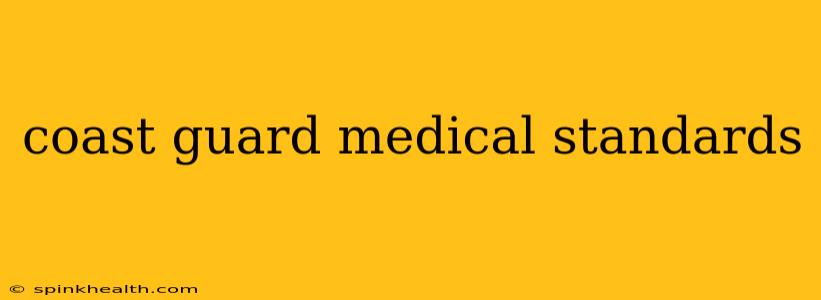Coast Guard Medical Standards: A Deep Dive into Physical and Mental Fitness Requirements
The United States Coast Guard, a vital part of our nation's maritime security, demands a high level of physical and mental fitness from its members. Aspiring Coast Guardsmen and those seeking to advance within the service must meet stringent medical standards to ensure they can effectively perform their duties, often in challenging and hazardous environments. This isn't just about passing a physical; it's about ensuring the safety and well-being of the individual and their crew.
Let's embark on a journey to understand these crucial requirements. We'll unravel the complexities, exploring the different aspects of the Coast Guard's medical standards and answering some common questions.
What are the basic physical requirements for joining the Coast Guard?
The Coast Guard's physical requirements are designed to evaluate a candidate's overall health and ability to handle the rigors of service. Think of it as a comprehensive health check, going beyond the usual height and weight measurements. This process assesses cardiovascular fitness, musculoskeletal strength, and overall physical stamina. Candidates must pass a physical examination performed by a designated medical professional, who will review medical history, conduct physical assessments, and run various tests based on the applicant's specific role within the Coast Guard. Failing to meet these standards can disqualify a candidate from service.
What are some common medical disqualifications for the Coast Guard?
Several medical conditions can lead to disqualification. These range from vision and hearing impairments that significantly limit operational capabilities to chronic illnesses like asthma or epilepsy that could pose a risk in emergency situations. Serious mental health conditions, uncontrolled diabetes, and significant cardiovascular problems are also grounds for disqualification. The specific criteria for disqualification are detailed in the Coast Guard's medical standards manual, which undergoes periodic revisions. It's crucial for applicants to have a thorough understanding of these criteria before starting the application process.
How does the Coast Guard assess mental health?
The Coast Guard recognizes the importance of mental well-being for its personnel. While it doesn't explicitly list specific mental health conditions as automatic disqualifiers, the assessment focuses on the applicant's overall mental fitness to handle the demands and stresses of Coast Guard service. This is a multi-faceted evaluation encompassing a detailed medical history review, psychological assessments, and potentially interviews with mental health professionals to assess an applicant's stability and resilience. The goal is to ensure candidates can cope with the pressures of potentially dangerous and demanding work environments, both at sea and ashore.
Are there waivers available for medical disqualifications?
In certain circumstances, waivers might be granted for minor medical conditions. The decision rests on a case-by-case review, considering the severity of the condition, its potential impact on operational readiness, and the individual's overall health profile. Applicants seeking a waiver must provide comprehensive medical documentation supporting their case. The approval process is rigorous and requires detailed substantiation of the individual's ability to meet the essential physical and mental demands of the role they are applying for. The chances of waiver approval vary widely and depend on the individual's specific circumstances and the nature of the medical condition.
What medical conditions are most likely to lead to disqualification?
While the specific details change, conditions that severely impair vision, hearing, cardiovascular function, or respiratory health are most likely to result in disqualification. Uncontrolled epilepsy, diabetes, or other chronic illnesses that could be exacerbated by the rigors of Coast Guard service also significantly impact the chances of acceptance. It’s essential to remember that this is not an exhaustive list, and each case is evaluated individually, taking into consideration the severity and controllability of the medical condition in question.
How often are Coast Guard medical standards reviewed and updated?
The Coast Guard's medical standards are not static; they are regularly reviewed and updated to reflect advancements in medical knowledge, technology, and operational requirements. This process ensures that the standards remain relevant and effective in protecting the health and safety of Coast Guard personnel, while also maintaining high operational readiness. The frequency of updates varies, but they are undertaken periodically to maintain alignment with the latest medical understanding and best practices.
The Coast Guard's rigorous medical standards are crucial for maintaining the operational effectiveness and safety of its personnel. Understanding these requirements is paramount for those aspiring to join or advance within this vital service. The process is thorough and emphasizes ensuring the well-being of both the individual and their fellow service members. Those with medical concerns should seek guidance and appropriate medical evaluations well in advance of applying.

